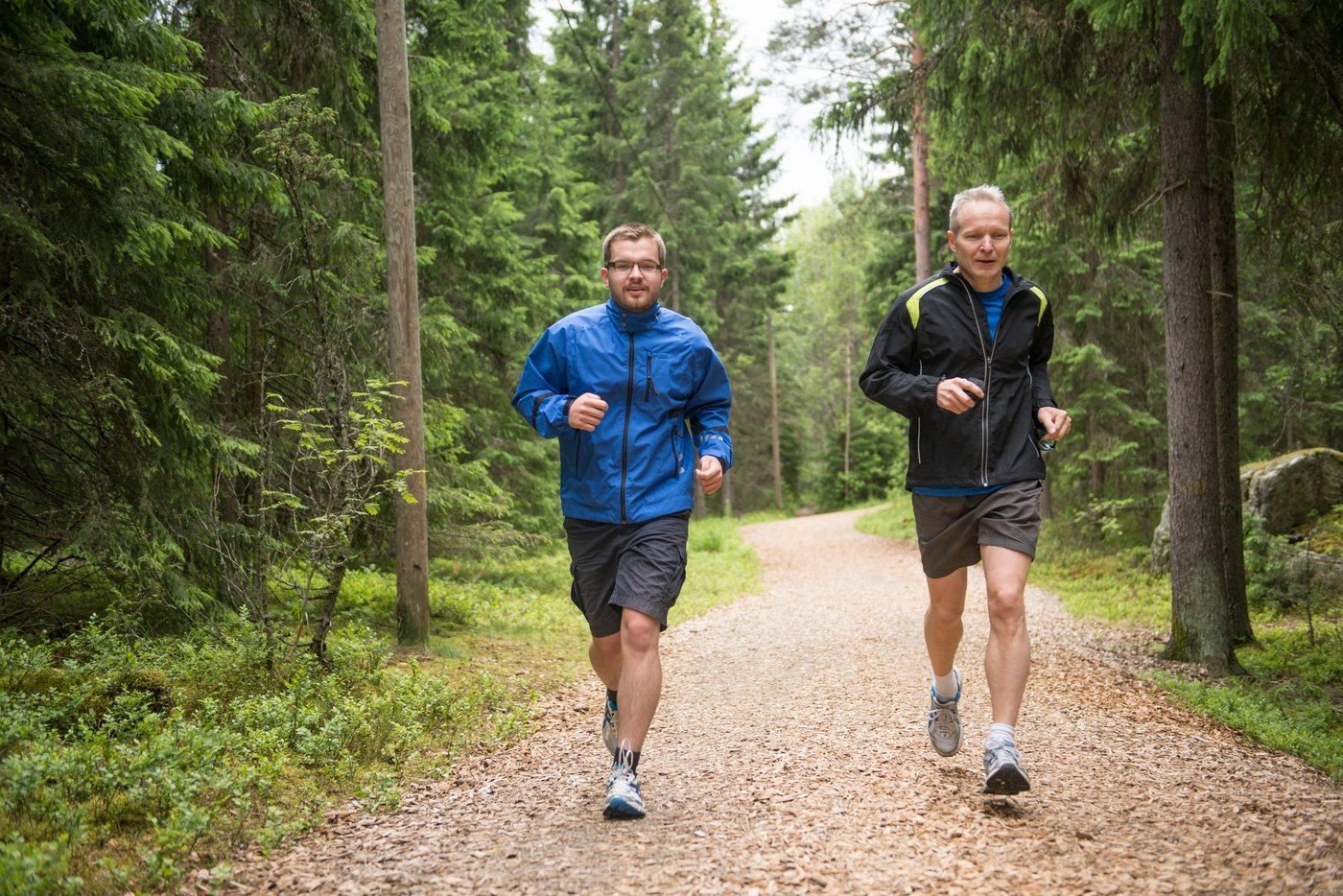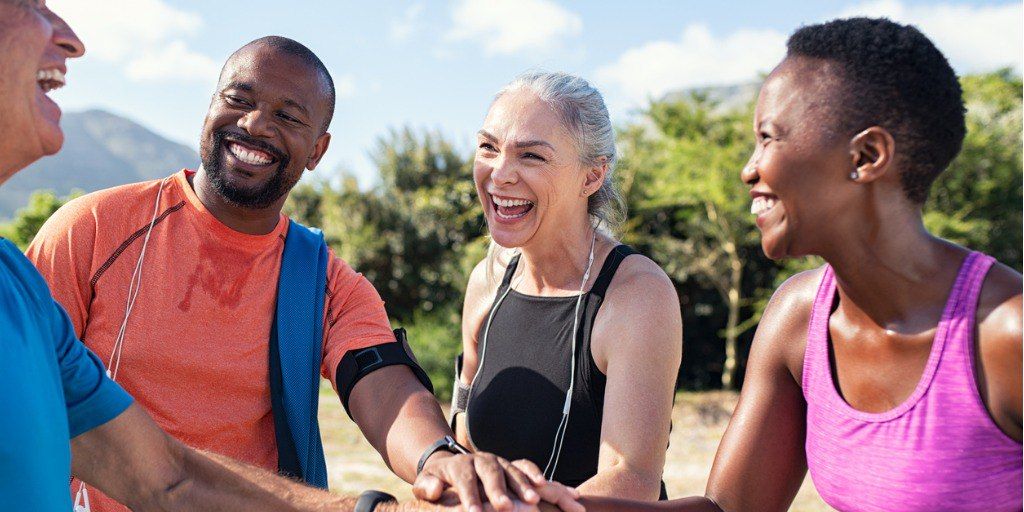7 Habits to Stay Fit After 50 for Men
April 20th, 2021 | 5 min. read

Aging well is all about forming habits that are good for you, like regular exercise and a healthy diet. A healthy lifestyle should be a lifelong pursuit, but after age 50, and especially for men, it’s even more important to maintain healthy habits to keep you strong and active longer.
If you’re not sure where to start, try these seven habits for men to stay fit after 50.
1. Do not skip routine screenings.
The first tip for folks who want to stay fit is routine screenings. It really needs to be said that an ounce of prevention is worth a pound of cure. I'm sure that everyone's heard that before, but it is true. A yearly physical is the easiest healthy habit to form, because you only have to do it once a year. You may be tempted to skip your yearly appointment if you feel fine, but routine screenings by your doctor may catch a health risk before it becomes a problem.
If we catch things early, oftentimes we can catch them before they get too big, before the fix becomes a little bit too complicated or expensive.
Routine screenings are incredibly important for men, especially as they pass the 50-year mark. Always be sure to talk to your doctor about getting the appropriate routine screenings for you. For example, colonoscopies, no one really wants to talk about them, but they are very recommended for people over 50. If you have a family history or some other situation, it might not be a bad idea to get them before you're 50, but routine screenings are very important as we want to age healthily.
2. Get your heart rate up (aerobic exercise).
The other thing to think about when we try to stay fit after 50 is getting the proper amount of aerobic activity. The national guidelines are 150 minutes, which sounds like a whole lot per week, but it's really only 2.5 hours per week. And if you think about a daily average, that's 22 minutes of aerobic exercise a day.
This can be pretty much anything that gets your heart rate a little bit above average. It can be walking. It can be jogging. It can be yard work. Ut could be housecleaning. Lots of things count as aerobic activity.
A good rule of thumb is anything with a heart rate above 100 beats per minute is going to be very beneficial.
At the same time, excessive aerobic activity might not be that beneficial because we do have to worry about our cortisol levels. Cortisol is the stress hormone. Think about that as you get your aerobic exercise. A lot is great, as long as it's right at the right exertion level.
3. Use your muscles to move weight (resistance training).
As we get older, it's really important to take care of the muscles that move weight. To pick things up, it takes skeletal muscle. The more we pick things up, the stronger our muscles get.
Also, the muscles pull on the bones, so the bones respond, and the bones get stronger as well. It's really important for folks after they turn 50 to do some resistance training.
Again, the proper amount is key. Just like we talked about with aerobic activity, excessive weightlifting can be detrimental. It can cause a lot of stress in the central nervous system. The right amount is key. But remember, move some weight. It can be body weight, dumbbells, kettlebells, barbells. Just move weight to fight gravity is what I like to say.
Make sure to consult your doctor before beginning a new exercise routine. If you experience any pain during exercise, stop and evaluate the pain. To eliminate the pain, you may need to modify your routine.
4. Drink more water.
Another thing to think about is drinking more water. When people talk about drinking more water, it's kind of like that an ounce of prevention is worth a pound of cure. It's really important.
A lot of times we think we're hungry when we are actually thirsty. So drinking water is key. It can be done. Keep a mug beside you, fill it with water or perhaps a tea that you don't think is a diuretic. You don't think it makes you urinate too much. Trust your body. Coffee might work for some people.
Everybody is different but hydrate a lot, especially with water. Water hydrates the body and much of our body is made up of water - 70% just like the Earth.

5. Consume enough micronutrients.
The next thing to think about is micronutrients. Micronutrients are really tiny nutrients. Not the macronutrients (fat, carbohydrates, and proteins), but the nutrients we need in small amounts like zinc, vitamin D, magnesium.
These are really important for so many different aspects of our human body functioning. Zinc, we hear a lot about the immune system. It also helps with testosterone production.
Magnesium is incredibly important for around 300 or 400 different enzymatic reactions in the body. Foot soaks are great for magnesium because magnesium can come through the skin pretty effectively.
Also, think about vitamin D. Supplements of Vitamin D have been shown to be effective, but also proper sun exposure can increase vitamin D levels. Those are three micronutrients that are really important, but there are others. Always be sure to talk to your doctor if you have a question about interactions with any drugs you might be taking.
6. Consume more protein and anti-inflammatory fat.
Now, we're going to talk a little bit about the macronutrients. For men who want to live healthily and fit after 50, it might behoove you to increase protein and anti-inflammatory fats.
Protein comes from the Greek word, meaning primary. It is incredibly important. When you think about your body, it’s pretty much made of proteins. We're talking about the skin and the muscles.
If we eat more protein, one, we might be satiated sooner with less food because protein is very satiating. Second, we're able to repair those skin cells, we can repair those joint cells, and we can repair those muscles or make new muscle cells, make new skin cells, make new joint cells. Really important to get a lot of protein.
Also the anti-inflammatory fats. We're talking about the Omega-three fatty acids, which can be found in green leafy vegetables or hemp or walnuts in particular. Some other nuts, too, but walnuts are a great one or a cold-water fish. Everyone talks about salmon, and halibut too, but those anti-inflammatory fats really important for cardiovascular health.
7. Consume less carbohydrates and inflammatory fat.
On the flip side when we talk about macronutrients are carbohydrates and inflammatory fats. More and more research is coming out showing that inflammatory fats, the Omega six fatty acids, cause inflammation.
They can cause blood clots leading to stroke and heart attack. They can cause water retention and they can cause high blood pressure, which are conditions that we really want to guard against.
Reducing our consumption of inflammatory fats like those Omega six fatty acids might help us with that.
Also, some carbohydrates can be necessary for mood or for sleeping. Athletic performance can sometimes improve when there are a little bit more carbohydrates, but a lot of us probably eat a bit too many carbohydrates throughout the day.
This can cause some problems with insulin. The more carbohydrates we eat, the more insulin we produce to get the sugar out of the blood. If we have too much insulin, that can cause insulin resistance and hyperinsulinemia. This can come before obesity.
Obesity comes after insulin resistance and hyperinsulinemia, which recent research is showing to be incredibly important to keep our insulin levels down throughout our life.
Access Wellness University & Certified Health Coaches
PartnerMD memberships include access to our members-only wellness program, Wellness University, which delivers more than 70 physician-approved courses and certified health coaching targeting the 4 areas most critical to your health, including stress and sleep, brain health, nutrition, and strength and mobility.
With offices in Richmond, VA; Midlothian, VA; Short Pump, VA; McLean, VA; Baltimore, MD; Greenville, SC; and Atlanta, GA, you can experience primary care built around you, one focused on wellness and prevention to help you stay as healthy as possible, as long as possible. Learn more about health coaching at PartnerMD.
Aaron Benator, Certified Health Coach
As a certified health coach at PartnerMD in Greenville, SC, Aaron provides personalized coaching tailored to your needs. He focuses on nutrition, exercise, and mental well-being. Aaron emphasizes a balanced lifestyle and is dedicated to helping you achieve your wellness goals.
